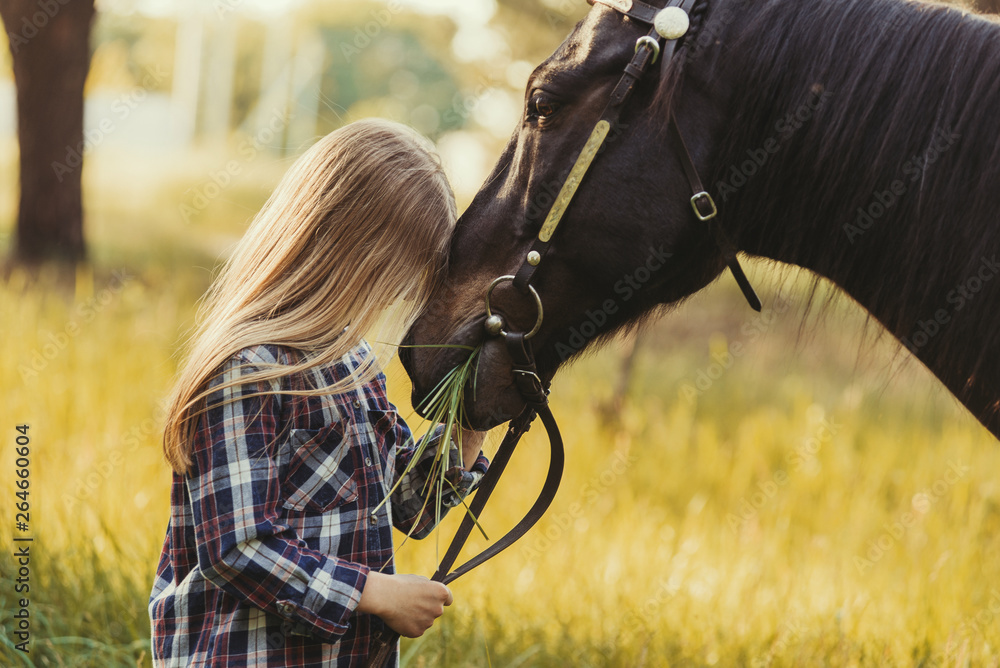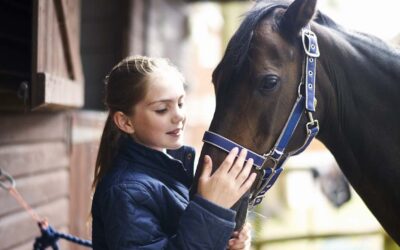Why are Horses Often the Best Therapists?
The government declaring the opioid crisis a national emergency leaves little debate that our society are struggling to escape reality. How our nation arrived here and how we get back on track are two questions that require a great deal of analysis and self-reflection. The answers may not be discovered in our lifetime, but our nation’s immediate survival depends on implementing the most effective solution-focused treatments to help the millions suffering with Substance Use Addiction.
Horses are effective partners in beginning this healing process.
A century ago, Winston Churchill knew what a university recently proved: Horses help people heal. He stated, “There’s something about the outside of a horse that’s good for the inside of a man.” In 2015, Washington State University unveiled quantitative studies showing reduced stress in youth, measured through cortisol levels in saliva, when they are around horses.
Additionally, programs in over 49 countries use evidence-based models, such as the one created by the Equine Assisted Growth and Learning Association, EAGALA, as a therapy and learning platform to help many recovery clients begin their sober journey towards a fulfilling future.
This begs the question, “Why are horses so effective in working with clients recovering from Substance Use Disorder?”
Many struggling with addiction spend years using drugs and alcohol to stay “numb and not feel.” Feelings of shame, guilt, anger and resentment bubble close to the surface but can be pushed back down with their next “high.” Being genuine or authentic equates to vulnerability and the risk of being rejected, again. This is to be avoided at all costs. Typically, well into their “use,” clients realize they cannot selectively numb just the painful feelings. Numbing eradicates both the good and the bad. Any small joys or dreams are eradicated as well. The resulting years of “emptiness” and lack of connection proves more excruciating than the pain they originally sought to escape.
Once in recovery, clients recognize the arduous but necessary task to re-build the necessary precepts for connection. Often CBT (Cognitive Behavioral Therapy) and DBT (Dialectical Behavior Therapy) play important roles in this process. However, those clients with extreme trauma often get “stuck” in the process or impatient with the pace of these traditional methods.
Equine Assisted therapy is one of the few alternative methods serving as an effective treatment solution for this population. A client’s ability to be emotionally authentic with themselves, a horse and finally loved ones is arguably one of the most challenging and significant steps in the recovery process.
Why are Horses So Effective With Recovery Clients?
Horses’ effectiveness with this population occur for two main reasons:
- what they offer us, and
- what they require of us in order to share “their space.”
What Horses Offer Us:
Acceptance without judgment
Horses don’t care how many educational degrees we’ve earned, how much money we have, which laws we’ve broken or the number of times we’ve relapsed. The normal “external” means of measurement against which we are accustomed to others judging us is worthless “currency” in a horse’s world. Once stripped of this arbitrary minutia, we have one thing of value to offer them – who we genuinely are, at our core. And horses offer complete acceptance – absent of any judgment.
One might argue this is true with most animals. However, there is something about a horse’s magnificent size, stature and strength which plays a part here, akin to the “gentle giant” effect. It’s difficult to articulate, but I’ve heard clients comment on it repeatedly.
Honest, Immediate Body Language as feedback
A horse’s body language is immediate, consistent, and easy to read. We often say “your life shows up in the arena.” And witnessing horses interact and “play out” behavior patterns from clients’ lives is a “lightbulb” moment clients don’t soon forget. During one of our sessions, one of the female clients said she felt really connected to a horse she chose to work with. During an exercise, she noticed during their walk the brown horse would stop, look back at the grey horse, and then continue on. After 4 or 5 times of this same pattern, the client slowly lowered her head and her shoulders dropped. As I approached, the tears streaming down her face didn’t surprise me, but the fact she was smiling quite honestly did. It was obvious she realized something very significant. I asked, “What’s happening?” She shared, “This brown horse is me. The grey horse is my husband. I don’t make a move in life without first stopping and checking with him. Watching them interact I just realized I’ve become so co-dependent on him I don’t even know WHO I AM except through HIS eyes. This sounds so silly, but I feel like this horse just told me I have the courage to figure out who I am, and it’s time to do that – even though I’m scared. I’ll never forget seeing these two horses show this to me. People have told me I’m codependent before, but I rejected it. I see it now. But I don’t feel defensive or angry like I did when therapists and other people told me. The horses just showed me – like it’s not that big of a deal.. it’s a problem, you can get through it, and now it’s time to get better.”
What Do Horses Require Of Us To Share Their Space?
We must become like them – 100% authentic
People choose to be authentic or genuine, or not, in any given moment. We not only feel emotions internally, but simultaneously “wear a face” that either reveals or masks this feeling to the rest of the world. When asked, “How’s it going?” how often do we answer honestly? Most of us don’t want to experience negative emotions like fear, sorrow, anger or depression, much less share them with others. In an effort to avoid this pain many people either “stuff” and/or ignore the feelings or just flat out lie when asked, responding “I’m great, couldn’t be better.”
With the ability to choose authenticity, sometimes we take the easy way out. Let’s face it, sometimes feelings are, at best inconvenient and, at worst downright painful. Who has time for this in this fast-paced world? Don’t we all want to avoid pain? However, there’s a reason we experience emotions, and avoiding feeling them comes with a consequence.
Many addictions start by people using drugs or alcohol to numb the feelings they don’t want to feel. For the ones who survive after the illness has taken hold, crawling out of this deep hole becomes a struggle lasting years. Battling addiction is often a daily street fight – during which their behaviors plant seeds of a generational disease and bring collateral damage to the loved ones closest to them.
Horses are ALWAYS Authentic
Unlike people, horses cannot “stuff” their feelings or be deceptive at any level. They cannot choose to be inauthentic. They are genuine and transparent 100% of the time. They feel every single emotion the second they have it. The emotion doesn’t pass through a filter that deems it as good, bad, painful or enjoyable; it just is. And as soon as they experience the feeling, it’s simultaneously displayed through their body language — and more often than not – acted upon. With a mere “look” and slight pinning of his ears, a horse can move another horse out of “his space” from a distance of 20 feet away. Clear, honest, and immediate non-verbal communication is one of the main reasons horses are so effective for therapy.
As a matter of survival, horses will not trust or connect someone who’s inauthentic, or whose “insides don’t match their outsides.” The horse translates this incongruence as, “if you’re showing the world one emotion and feeling another, what are your true intentions with me? Are you going to hurt me?”
As a result, clients can only connect with a horse when they are genuine and authentic or “congruent.” If a client accomplishes “congruence and connection” with a horse inside of the arena, it lays the groundwork for transference of the skill to life experiences outside of the arena.
Horses Require us to be “actively present”
Another cognitive skill people possess is our ability to operate on “auto-pilot.” We can split our attention in order to accomplish multiple tasks simultaneously. This skill is definitely an asset, but sometimes we “stay in our heads” to escape being in the present. Look at any family having dinner together at a restaurant and you notice how drastically phones and electronics have divided our attention and focus. Some of us don’t use phones in this way but think about mistakes in the past or concerns in the future so much we’re rarely in the present.
Whether it’s a coping mechanism, obsession, escape, or a combination isn’t important – what is important is avoiding being in the present. Being present requires us to be vulnerable, slow down, and focus. These actions are unfamiliar, uncomfortable and present a significant challenge to many of us. But this challenge is exponentially more difficult and often debilitating for clients struggling with Substance Use Disorder.
Being prey animals, horses are instinctively in a perpetual state of “survival readiness” of fight or flight. For millions of years, horses’ continued existence relied solely on their ability to be alert and react to threats in a millisecond.
As a result, the limbic portion of horses’ brains physically adapted to develop an ever present hyper-vigilant state and a highly sensitive intuition. This intuition can not only measure our authenticity but can accurately measure our ability to lead and protect them. The skills of a competent leader are vigilance, increased awareness and swift appropriate responses. And logically, any deficits in these areas present risks. Similar to any leadership role in life, the first step is to show up with your authentic self.
When the horse’s requirement for our “active presence” combines with a client’s strong desire for connection, this catalyst creates a life-changing moment. Once again, working with horses expands our boundaries of comfort to help us heal.
Clients often say their equine therapy experience was one of the most remarkable and life-changing experiences of their treatment journey. We are humbled and proud to have been a part of it.




